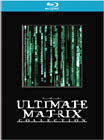
- Film 1: The Matrix
- The Animatrix:
.. - The Second Renaissance
.. - Kid's Story
.. - Program
.. - World Record
.. - Beyond
.. - A Detective Story
.. - Matriculated
.. - Final Flight of the Osiris /
.........Enter the Matrix
- Film 2: The Matrix Reloaded
- Film 3: The Matrix Revolutions
- Return to Source Documentary:
Philosophy and the Matrix

SCIENCE FICTION:
- Doctor Who
- Sliders
- Star Trek:
. - The Original Series (TOS)
. - The Animated Series
. - The Movies
. - The Next Generation (TNG)
. - Deep Space Nine (DS9)
. - Voyager
. - Enterprise
Non-Fiction:
- The Fourth Density
- interviews
- political evolution
- The Philadelphia Experiment
|
The Matrix
 |
 |
 |
DVD NTSC
Region 1
10-disc box set
for North America
 U.S.
U.S.

 U.S.
U.S.

 Canada
Canada

|
DVD PAL
Region 2
10-disc box set
for the U.K.
 U.K.
U.K.

|
|
(A trilogy, part 1, starring Keanu Reeves)
- written and
- directed by the brothers Larry and Andy Wachowski
- produced by Joel Silver
- music by Don Davis
- 2 hours, 16 minutes
|
Story: What is the Matrix? Under the alias Neo,
computer hacker Thomas Anderson embarks on a wild journey
to find out, unravelling conspiratorial rumours of the nature
of society's systems as he goes, linking up with the mysterious
underground rebel figures Morpheus and Trinity, and battling
the agents of the system.
|
|
In-Depth Analysis Review
by Martin Izsak
|
|
WARNING: This review contains "SPOILERS", and is intended for
those who have already seen the film.
|
"The Matrix" has become known as the ground-breaking action film
for philosophical thinkers, and certainly deserves its fair share of kudos
for what it achieved. While the original film is certainly the best received
in the trilogy, even it has its drawbacks and can easily confuse audience
members who are not as deeply into its genres. While I generally like
and approve of this film, and believe I "get" most of what is philosophically
layered into it, I think the philosophy has a few whacking great flaws
itself. If there's one thing to keep in mind as we go through the saga,
it is this: We all know that the map is not the territory. But do we get
so wrapped up in various philosophical maps that we sometimes fail to see
the obvious in the basic territory of the film?
World of the Mind

|
|
The enigmatic trailers for the film drew audience interest with the
famous lines: "No one can truly tell you what the Matrix is.
You have to see it for yourself." Of course, long-time
Doctor Who fans like myself could take a very
good guess at what this Matrix might be, and not be too far off,
since something with the same name existed on the home planet of the
main character of that show, and featured prominently in many of
its mythological episodes, beginning about 23 years before
the Wachowski Brothers made their film. For those who found
"The Matrix" hard to follow, I suggest they try
"The Deadly Assassin" (Doctor Who story no. 88)
as a more easily understood primer, and then come back to another
viewing of this film.
|
One of the most enjoyable aspects of this film for me,
which set it above Doctor Who's "The Deadly Assassin",
is the way that the virtual reality of "The Matrix" was set up as
a metaphor for discovering the nature of our own reality,
specifically on levels of spiritual and philosophical truth. Nice.
BUT, this metaphor works chiefly for what is explored in the first film only.
Once we get to the sequels, other territory is explored, and quite rightly
too, but we're still stuck in a world defined by the old metaphor,
while new metaphors
to demonstrate the new philosophical territory are sorely lacking.
And the biggest spiritual/philosophical test for me is always what
the characters actually do, all metaphors aside, something that
gets wildly overlooked by people looking for too many hidden layers.
I think it should be noted that a lot of the necessary exposition
for this film and its concepts and metaphors is given to Morpheus, and
while there is a lot of good material there, Morpheus puts his own spin
on it. Watch out for the danger that this brings, as it becomes a very
enemy-centered paradigm, all defined within the context of a heroic battle
against an evil system of enslavement, and one in which our resistance gang
winds up putting more emphasis on saving themselves than helping
any helpless third parties, by virtue of the actions that get the most
screen time.
I was also quite surprised on my most recent viewing to hear how often
the concept of "breaking the rules" was repeated in so many different contexts
throughout the film. You'd think the protagonists might want to align themselves
with the universal laws of nature as opposed to those of man and/or machine, but
they seem to want to just break ANY rule they encounter instead, almost as a
knee-jerk reaction, whether the rule opposes something they want to do or not.
Again, they really would impress more greatly as thinkers if they started thinking
outside of the enemy-centered paradigm.
When The Action Hits the Fan....
While I like my sci-fi, whether obscure or blockbuster, and I regularly
root for rebellious underdogs taking a stand against insidious
conspiratorial systems,
I'm not particularly an "action" fan, nor a martial-arts fan, nor a fan of
gothic-punk stylizations, shiny leather and sunglasses and all.
"The Matrix" understood and excelled in these stylizations without
particularly impressing me, and that was all cool.
But excessive fighting often signals a lack of understanding of
spiritual philosophies. In itself, that won't hurt the first film
too much, since it's partly a story point, and
our main characters are all on something of a learning curve,
attempting to achieve things they have never achieved before.
Unlike the main character of "Doctor Who" under similar circumstances
in "The Deadly Assassin", Neo seemed pretty slow in coming to figure
out that he should use his mind in the first film, instead of buying into
the constraints of the virtual imagery in the Matrix. And for Neo,
that comes at a cost that I think is quite high.
The heavily stylized lobby shootout, although heavily praised by so
many on the DVD extras, remains one of the philosophical low points
of the trilogy for me. I have little interest in rooting for Neo or
Trinity during this sequence. The noblest of aims for Morpheus's gang
of rebels, generally speaking, is to free the human inhabitants of the
Matrix from the battery fields where they are plugged in. Instead,
Neo and Trinity go on a spree shooting up many of these very same poor souls
who clearly have no idea what it is they are supporting by acting as
policemen and guards for their government.
Ken Wilber is keen to say
on the commentary that the trilogy is more complex than saying that being
inside the Matrix is bad and getting out is good. Fine, it should be.
But getting out is better than getting knocked off by a supposed "hero".
Superman II offers a good
contrast during its climactic confrontation between hero and villains
with incredible powers, where Superman goes out of his way to make sure
that third parties come to no harm, and the villains take advantage of this
by threatening them. This is a very natural way of letting the audience know
who is the hero and who the villain, and helps get the audience rooting for
the right characters. In "The Matrix", this is pretty much reversed,
requiring the audience to accept an overly paranoid view of the world
in order to continue to root for Neo and Trinity during their violent spree.
This sequence revels in the by-standing casualties of the slowness of
Neo's learning curve, and is anything but a spiritual triumph. And when
content is this far off the mark, I care little for its style,
which this scene was obviously more focused on. The first time I saw
this scene, I thought it was getting so derailed that
I might end up really hating the whole movie.
It wasn't until my third or fourth viewing that I actually understood
the bit of plot-logic offered as a partial excuse for the excessive violence
exhibited by the trilogy's "heroes". An attempt is made to explain this
with the scene of the woman in red amongst the crowd at the fountain,
but it is only really demonstrated in tiny moments dotted throughout
the action sequences in the second half, and chiefly only in the first
film. Anytime you see any agent, you are really looking at an avatar
of one of the real people plugged into the Matrix, and that avatar has
been temporarily taken-over by the agent. If the agent is dealt a fatal
blow, it is only the real person who gets killed (through mind over
matter of course), while the agent is free to take over another body/avatar,
and will select anyone who happens to notice his quarry. Thus Trinity
kills a helicopter pilot when she shoots the agent in the head at point
blank range. Equally, Neo is in many ways fighting a feeble old vagrant
in the subway station, who eventually gets crushed under the subway train,
while Smith takes over some unsuspecting passenger on said train to continue
pursuing Neo. While this phenomenon has somehow promoted a practice
among the rebels to shoot anyone they encounter before that person becomes
an agent, it really is a cowardly and self-serving policy designed to
avoid what they feel will be a losing battle. They can talk philosophy
as eloquently as they want, but this is what their actions boil down to.
And if the agents want to describe the rebels as "terrorists",
it really is fair comment.
"If you could go back, would you really want to?"
If getting out is so good, and going back into the Matrix is so
potentially deadly for them and the people they would want to save,
you have to wonder why they ever do it? One answer, and potentially
the noblest, is to help get more people out. We really don't see much
of that in the entire trilogy, beyond getting Neo out at the very beginning.
You have to go to
the Animatrix episode about the backstory of
Clayton Watson's "Kid" character to see some more, although Neo is quick
to credit the proactivity for that event to the Kid himself.
The most common recurring reason for re-entering the matrix running
throughout the trilogy is.... (drumroll please).... talking to the Oracle.
Which feels a bit banal when you really get down to it. This usually
entails some characters coming out and going back in to rescue others
who didn't make it out yet, but once everyone's out, it's usually only
another Oracle visit that prompts them to go back in.
Indeed, the biggest surprise may be that all these hackers don't just
stay outside the Matrix writing code and inventing programs to go in and do
stuff. It somehow seems like the obvious gets a bit sidestepped here.
One of the successful things that the first film has going for it, which the
sequels do not, is Joe Pantoliano and his character of Cypher. Firstly, Cypher is
very well used by the script to make a specific point about the desirability of
a fantasy world. And secondly, Pantoliano seems to be having a very contagious bit of
fun with the role, livening up the atmosphere of the crew of the Nebuchadnezzar
and creating countless memorable moments. Many of the other actors involved
in this film also give their best performances of the trilogy here, in terms of emoting
well and giving their characters some personality, with Keanu Reeves in particular
being at his most human.
"I'm just another guy."
This film definitely tackles questions surrounding the idea of
a messiah, as noted by fans and critics alike. Morpheus leads the charge
in this particular belief system, and is eloquent and contagious enough
with it for it to stand as the dominant viewpoint of Neo's role.
Neo is "the One", and many people delight in examining Neo's path
and choices in comparison to Jesus Christ and other messiahs from
a dozen other religions. Excessive misdirection, I think. I've found
it gigantically useful and freeing to
never believe something is so in a film just because a character
says it is, even if no other character or event challenges what he says.
Personally, I see the whole need for messiahs acting as conduits for
spirituality as a subset of what I call third density consciousness,
which has dominated human existence throughout our recorded history.
However, the present-day challenge is the transformation to
fourth density, which in part has each person
reawakening to their own direct connection with the creative source.
In fourth density, messiahs are out of a job. There is no "One".
Thankfully, Neo himself articulates as much in one of the first movie's
poignant moments of decisive proactivity. I was prepared to trust
Neo's viewpoint as the film's truth, despite anything that Morpheus
said afterward. After all, Neo's belief would not require Morpheus
or Trinity to change theirs, which clearly served them.
Perhaps too, this heavily influenced my expectations of where
the future films should be headed. Neo's role would not be to solve
society's problems himself single-handed. Rather, he would simply
be the first to figure out how to get a grip on those problems,
and TEACH the rest of society how they might use
the same methods to solve some of their problems and make up their
own damn minds, should they so choose.
Mind Over Matrix
And though it came late, it came spectacularly and triumphantly.
Neo's mind conquered matter, and death, and he stood toe to toe with
an agent and took him apart from the inside out. Few films or
television episodes have a concluding moment as powerful and satisfying
as "The Matrix" has. Whoa. The tables were finally nicely turned,
as agents now ran from a rebel. Good stuff.
As Morpheus had explained earlier,
helping to motivate the entire thrust of this ending, the rebels' inability
to defeat agents was a stumbling block preventing them from doing anything
more proactive to help the people in the Matrix. But now, they might have
access to the keys and gateways of the Matrix.
For me, this meant that Neo, who had figured out how to defeat agents,
would teach other rebels how to do the same.
No longer would the rebels need
to exhaust their energy with physical fights, no longer would they need
to execute by-standing Matrix citizens en masse. Successfully using their
minds would elevate them beyond those needs.
And if that says anything spiritual about reality through using
the Matrix as a metaphor, it should then also apply without the metaphor....
in the real world. This would be the second great lesson tackled in
the sequels, I thought, if they were worth their salt. Mind over matter
must have its applications outside of the Matrix, and the world outside
the Matrix was ripe for exploration in the sequels.
Critics' Commentary - Film 1
I don't normally review commentaries, but those on "The Matrix" trilogy are so
unique, and add so much to what I'm discussing, that I will make exceptions at appropriate
points. The critics' commentaries are perhaps best to tackle as we look at each film,
while the philosophers' are best bundled together at the end
where we can discuss the trilogy as a whole.
Although these are supposedly the critics who did not like the trilogy, it must be
said that they largely do think that film 1 was good, and are fairly balanced between
praising it and nitpicking it. The end result is a very enjoyable, thought-provoking,
and very unique commentary for any film. It is excellent that the Wachowskis made this
happen.
The chief drawback with these critics is that they have seen too many movies, meaning they
are both a bit jaded and bored with anything that isn't "new", and also that they seem obsessed
with making references to earlier works in film or literature. Sometimes this is enlightening,
at other times it just distracts them from looking at the current film's content on its
own merits.
I believe it's Todd McCarthy who makes the very interesting point that there is a limit
to the willingness and benefits to puzzling out all the mythological/philosophical maps that
are in play here. But rather than giving up and making no effort, I suggest a keep-it-simple
approach, by keeping one eye on the territory at all times, and not trusting any one map
too much.
David Thomson also has an interesting point about desensitization to violence, which is
good to bring up. However, it doesn't seem to go far enough to detract from the critics'
enjoyment of the government lobby shoot-out, where I felt character motivation had strayed
too far into unacceptable territory.
The critics don't seem to really get the time difference in the two main domains here,
particularly that the in-Matrix world projects the illusion of 1999, while the outside is
200 years or more in the future, and they seem to want to poke irrelevant holes in the difference
between the technology of the two ages. As usual, commentators are required to talk over the film,
and so miss a lot of the points that the films' dialogue is making, which can be very frustrating
for a knowledgeable audience. But then you have to wonder how much they're really willing to
pay attention to important details, and how much they zoned out....
Backstory Science and Motivation
The sci-fi premise of the Wachowskis' world here is not without its significant holes.
If we do want to challenge our enemy-centered view of the machine AI antagonists,
it's important to understand their motivations and their mechanisms of control,
which quite frankly fall apart too easily. Using human body heat as power
doesn't quite fly. Firstly, why humans, considering there are so many other
species on Earth that would probably accept Matrix programming more readily?
Secondly, how do you not lose far more energy than you gain by passing food
and other human needs through the human? The best way of getting around this would
be to define yet another reason for the machines to require humans, something that
depends on their level of complex thought and intelligence - which wouldn't be
too far from what we get and could possibly patch over many motivational holes
in the trilogy, if only the movies had taken time to articulate something of that idea.
But perhaps this examination of sci-fi backstory and world setup is best
continued in the Animatrix two-parter that goes into greater detail about how it
all began....
"The Matrix" delivered a lot of great stuff, not least of which was
a healthy batch of anticipation for where it might go next. Yes, this
franchise was destined for more.....
|





 U.S.
U.S. Canada
Canada U.K.
U.K.

 U.S.
U.S.  Canada
Canada  U.K.
U.K. 
